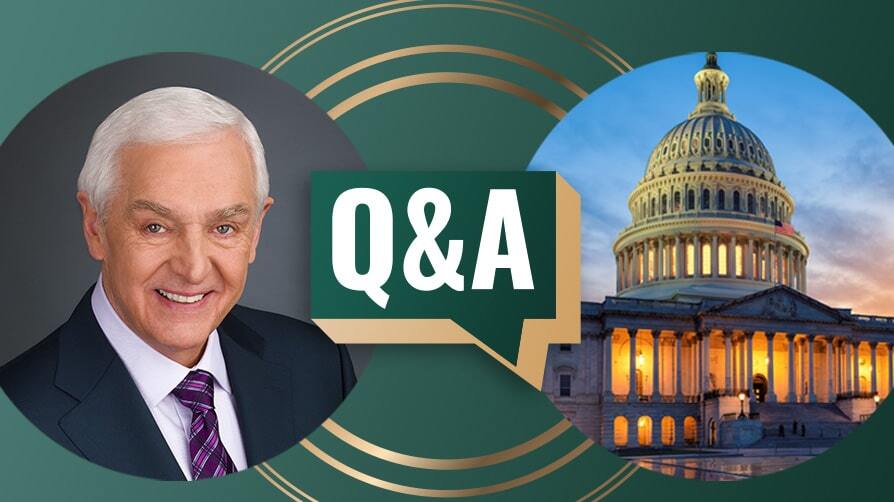I need help

Your response has been received, and we will be praying for you.
Look for answers to some of the most common questions in the weeks ahead.
Attitude can mean the difference between victory and defeat in whatever struggle we’re facing. Morale is half the battle, as historian Robert Mackay writes in his book by that title: Half the Battle: Civilian Morale in Britain During the Second World War. According to Mackay, from the outset of World War II, the British Ministry of Information and its partnering agencies “attached great importance to people’s states of mind, measuring the fluctuations in cheerfulness, how much people were interested in the war news and whether they were optimistic about victory or the future more generally.”1
At first, there was very little optimism about victory. Looking back from the perspective of history, it’s easy to miss the hopelessness of the times. England’s prospects were bleak, and some in the government wanted to seek terms of peace with Hitler. One aristocrat said, “It’s madness to suppose we can beat Hitler.” Another person on the opposite end of the social spectrum said, “I think they’re going to beat us, don’t you?” Another man wrote in his journal, “My reason tells me it will now be almost impossible to beat the Germans.” A young pilot in the Royal Air Force wrote home saying, “I don’t give much for our chances.” Even Winston Churchill himself said to a military assistant during a particularly grim moment, “You and I will be dead in three months’ time.”2
{ms_advert_7_box}Yet somehow the British Isles found the courage, cheerfulness, and resolution to press through to victory. The improved morale was due in part to a trio of posters created by the Ministry of Information. Mr. A. P. Waterfield, the Deputy Secretary of the MOI, composed the poster that said: YOUR COURAGE, YOUR CHEERFULNESS, YOUR RESOLUTION WILL BRING US VICTORY. Critics lambasted this slogan as being overly simplistic and condescending, especially because of its mixed use of the pronouns YOUR and US. Many felt their leaders were “talking down” to the public. Yet the message rang true, for people instinctively understood that only the triple–braided rope of courage, cheerfulness, and resolution could pull them through.
God’s Word Provides Wisdom in Troubled Times
In a sense, the Bible is God’s “Ministry of Information,” His ministry of providing the wisdom we need for abundant living. In Scripture, we see that courage, cheerfulness, and resolution are three valued qualities needed for the battles we’re waging against the world, the flesh, and the devil. As soldiers in God’s army, we’re fighting principalities, powers, the rulers of the darkness of this age, and spiritual hosts of wickedness (Ephesians 6:12). The apostle Paul talked about the internal war raging inside each of us in our flesh— “But I see another law in my members, warring against the law of my mind” (Romans 7:23). Peter talked about “fleshly lusts which war against the soul” (1 Peter 2:11).
In all our daily battles, we need the courage, cheerfulness, and resolution described in God’s Word.
In all our daily battles, we need the courage, cheerfulness, and resolution described in God’s Word so we can experience the reality of 1 John 5:4: “And this is the victory that has overcome the world—our faith.”
Which of these elements do you need the most right now: Courage—the “fear–not” attitude of the Bible based on God’s protective care? Cheerfulness—the joy of heart and mind based on God’s Holy Spirit? Resolution—the determination to keep your eyes on Jesus until the battle is over and the victory is won?
God’s Word Provides Guidance for Today
Let me give you some passages to read, to pray, and to claim in each category. Don’t skip over these verses; look at them carefully. Perhaps one of them will jump off the page and land in the middle of your mind just as you need it.
Courage
Be strong and of good courage, do not fear nor be afraid… for the Lord your God, He is the One who goes with you. He will not leave you nor forsake you. (Deuteronomy 31:6)
Be strong and of good courage; do not be afraid, nor be dismayed, for the Lord your God is with you wherever you go. (Joshua 1:9)
Be strong and of good courage, and do it; do not fear nor be dismayed, for the Lord God—my God—will be with you. He will not leave you nor forsake you, until you have finished all the work for the service of the house of the Lord. (1 Chronicles 28:20)
Wait on the Lord; be of good courage, and He shall strengthen your heart. (Psalm 27:14)
Cheerfulness
A merry heart makes a cheerful countenance. (Proverbs 15:13)
Son, be of good cheer; your sins are forgiven you. (Matthew 9:2)
Be of good cheer, daughter; your faith has made you well. (Matthew 9:22)
In the world you will have tribulation; but be of good cheer, I have overcome the world. (John 16:33)
Resolution
Daniel resolved that he would not defile himself. (Daniel 1:8, ESV)
To this end we always pray for you, that our God may make you worthy of His calling and may fulfill every resolve for good and every work of faith by His power. (2 Thessalonians 1:11, ESV)
When he arrived and witnessed the grace of God, he rejoiced and began to encourage them all with resolute heart to remain true to the Lord. (Acts 11:23, NASB)
I am resolved to obey Your statutes to the very end. (Psalm 119:112, HCSB)
If the Lord of Glory is our hope and confidence, there is no reason to be fearful or sad.
To the very end, we can be more than conquerors through our Lord Jesus Christ (Romans 8:37). Every struggle we face relates to the cosmic battle He waged on the cross. And every victory is won through the triumph of the empty tomb and our resurrected Savior. Hebrews 1:3 records: “When He had by Himself purged our sins, [He] sat down at the right hand of the Majesty on high.” Colossians 2:15 adds: “Having disarmed principalities and powers, He made a public spectacle of them, triumphing over them in it.” The cross and the resurrection of Jesus ratify every verse in the Bible. If the Lord of Glory is our hope and confidence, there is no reason to be fearful or sad. Instead, we can be courageous, cheerful, and resolute.
God’s Word Provides the Perspective of Victory
In her book On the Home Front: Growing Up in Wartime England, children’s writer Ann Stalcup describes her first memories as a preschooler. At the outset of World War II, she was handed a gas mask that looked like a pig’s snout and smelled foul. She was terrified to try it on. Day after day, her family gathered around the wireless for hours at a time, straining to hear and understand every word. “Everyone was anxious to know exactly what was happening,” she said, “and whether the danger was getting closer.”
Ann was ten when the war ended. She was sitting at her desk in school when her class was told Germany had surrendered. “And no sooner did we hear the news,” she wrote, “than the church bells began to peal. They had been silent for six long years. During the war, church bells were to ring only to signal an invasion. We were given the rest of the day off and told that the next day, May 8, would be a national holiday. We couldn’t believe our luck. The wireless was calling it ‘V. E. Day—Victory in Europe Day.’
“I walked home from school that morning, alone. I found that I had a lot to think about. I passed a big poster that had been on the same brick wall for almost six years. I read it again, just as I’d read it every day since I’d learned to read: YOUR COURAGE, YOUR CHEERFULNESS, YOUR RESOLUTION WILL BRING US VICTORY.”
“And it had!” she said.3
Yes, it had. And the same is true for us. Whether we are facing an invasion by foreign powers or a devastating disease, our attitude—our state of mind—is half the battle. If you’re feeling the heat of the battle right now, draw courage, cheer, and resolution from the verses in God’s Word that speak of His overcoming power and overwhelming grace. Claim them today and, as you do so, remember this:
HIS COURAGE
HIS CHEERFULNESS
HIS RESOLUTION
HAS BROUGHT
US VICTORY.
This article was adapted from the May 2013 issue of Turning Points Magazine and Devotional, a ministry of Turning Point with Dr. David Jeremiah.
Sources:
1Robert Mackay, Half the Battle: Civilian Morale in Britain During the Second World War (Manchester: Manchester University Press, 2002), 1.
2Max Hastings Quotes from “A Gloriously Flawed Hero: How Winston Churchill Saved This Nation from the Brink of Extinction” in The Daily Mail, August 17, 2009.
3Ann Stalcup: On the Home Front: Growing Up in Wartime England (Lincoln, NE: Author’s Choice Press, 1998, 2002), 76–77.
{ms_advert_3_row}From Living With Confidence in a Chaotic World
By David Jeremiah
There is no doubt we have encountered political unrest and worldwide disease and economic failure in the past, but I would suggest that there’s never been a time in our collective memory like this current moment—the world is in turmoil.
But don’t be discouraged when difficult days seemingly surround us. Just before Jesus Christ returns to earth, keeping the promise He made to His disciples, the Bible says a troubling time will arrive. And, my friends, it’s quite possible that we have entered the early stages of those events.
In Paul’s first letter to the Thessalonians, we are told: “But concerning the times and the seasons, brethren, you have no need that I should write to you. For you yourselves know perfectly that the day of the Lord so comes as a thief in the night. For when they say, ‘Peace and safety!’ then sudden destruction comes upon them, as labor pains upon a pregnant woman. And they shall not escape” (1 Thessalonians 5:1–3).
{ms_advert_3_box}As I think about that passage, I find myself observing how that metaphor about labor pains perfectly fits the headlines I’ve been reading. An expectant mother endures quite a trial as she prepares for the birth of her child. She has morning sickness, she goes through all kinds of other drastic bodily changes, and then the labor pains arrive. As that child prepares to enter the world, the mother’s discomfort is amplified—it’s a message that God doesn’t want her to miss. Rejoice! Your child is on the way!
Similarly, our world is in pain even now. We will feel it as the nations quake. Yet we can cry out, “Rejoice! Your redemption is near!” This pain, this confusion, this anxiety is only for a little while longer.
Let’s return to that frightening term catastrophe. It’s an odd four–syllable word, isn’t it? In fact, it represents the union of two Greek words: cata, meaning “over,” and strophe, meaning “to turn.” The full picture is one of overthrow, of everything turning over in sudden and violent change.
You and I have experienced that kind of change, that kind of violence—the world turning over in chaotic spasms. And each time we experience it anew, we are confronted with that same critical question: “Is there any way to live with confidence in a chaotic world?”
It’s a question we need to answer. You see, we no longer have the luxury of sitting back in our recliners, stroking our chins, and examining this spectacle from some distance. Because of our increasingly connected world, we are now all players in global events. When one nation struggles, we all struggle. When yet another catastrophe strikes, we’re all affected.
We need a plan, and we need one as quickly as possible.
Thankfully, we can find that plan within the pages of God’s Word. As I have scoured the books of the New Testament, I discovered ten practical strategies to help us live with confidence in a chaotic world. Each one assures us of Christ’s return and shows us how to live until then. What a blessing it is to know the right way to respond when our challenges exceed our courage!
As we face the uncertainty of our troubled generation, we cannot afford to turn away from the priceless counsel of the Word of God. We need it more than ever because it provides a firm foundation even when the world seems in the grip of quicksand’s undertow.
I feel the anxiety of these times, but I also draw profound peace from the promise that Jesus gave to His disciples—that includes you and me—in the Upper Room. He told them that He would never leave them without comfort: “The Helper, the Holy Spirit, whom the Father will send in My name, He will teach you all things, and bring to your remembrance all things that I said to you. Peace I leave with you, My peace I give to you; not as the world gives do I give to you. Let not your heart be troubled, neither let it be afraid” (John 14:26–27).
In those words, I can hear Jesus speaking to our generation. He assured us that we do not need to live in fear, no matter what the headlines say. Jobs can be lost, homes can be destroyed, but the love of Christ is forever. Understanding that truth calms our spirits and allows us to begin thinking—really thinking—about the new world around us.
As we work through the ten chapters of this book together, I pray that you will see your own circumstances with new eyes and that you will look within yourself, finding new courage not in your own strength or skills, but in the unlimited resources of Christ, in whom we can do all things.
Then, as we finish these pages, we won’t be tempted by the promise of escape—not even to our own private island in some faraway paradise. No, in the midst of it all we can place our trust in the promises, power, and love of almighty God, and we can live with confidence in an age of chaos.
Living With Confidence in a Chaotic World by Dr. David Jeremiah is published by W Publishing, an imprint of Thomas Nelson. All rights reserved.
{ms_advert_6_row}















